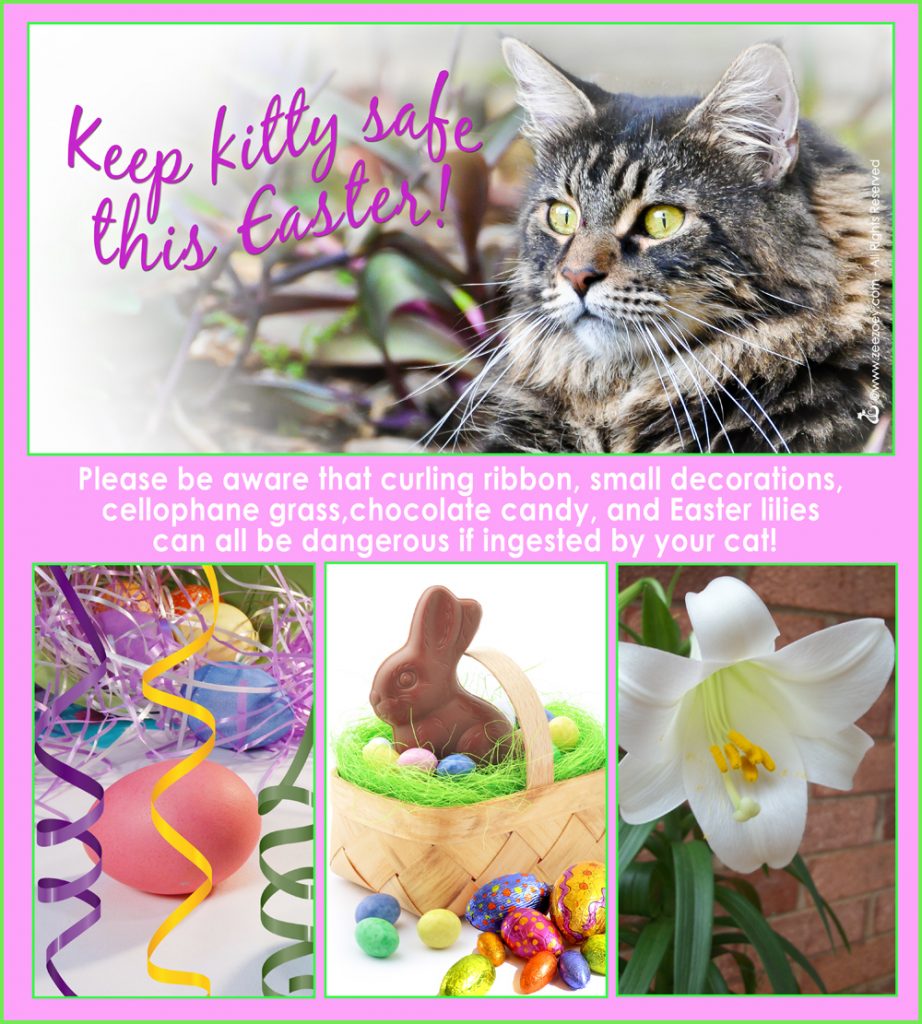Spring Cleaning, Covid, and Easter Safety Tips for Cats for Poison Prevention Awareness Month
 According to the most recent White House briefing (22MAR21), the United States is vaccinating about 2.5 million people per day. There are 81 million people — or nearly 1 in 3 adults — with at least one vaccine dose and 44 million who are fully vaccinated. Eligibility requirements are changing too, with each state providing its own plan for deciding who will be vaccinated first. Here in Florida where I live, vaccines are now available for persons 40 years of age and older; persons determined to be extremely vulnerable by a physician; health care workers with direct patient contact; and long-term care facility residents and staff.
According to the most recent White House briefing (22MAR21), the United States is vaccinating about 2.5 million people per day. There are 81 million people — or nearly 1 in 3 adults — with at least one vaccine dose and 44 million who are fully vaccinated. Eligibility requirements are changing too, with each state providing its own plan for deciding who will be vaccinated first. Here in Florida where I live, vaccines are now available for persons 40 years of age and older; persons determined to be extremely vulnerable by a physician; health care workers with direct patient contact; and long-term care facility residents and staff.
Restrictions are changing by state, too, with many establishments and institutions relaxing or lifting mask-wearing mandates and changing physical distancing from other people who are not from your household in both indoor and outdoor spaces from 6 feet to 3. That said, a year later and with Easter only days away – a day earmarked by social gatherings, whether groups of people at church or a restaurant or family celebrations at home, safety, and social distancing is still of paramount concern, and now is not the time to let our guard down.
With March Poison Prevention Awareness Month, the topic is even more relevant because we need to remain diligent in keeping our homes and hands properly disinfected, being mindful the holiday can be a fertile breeding ground for COVID outbreaks. Safety is important for us, but it’s also important for those people who live with cats who are cooped up in close quarters with them. Precautions must be taken to keep kitty away from Easter goodies and plants, the cleaning products we use to kill the virus that causes COVID, and general spring cleaning supplies because many can easily sicken or even kill our pets, especially cats who are particularly vulnerable due to their small size.
Here are 10 great tips to keep kitty safe during Easter, Covid, spring cleaning, and beyond:
1. Easter baskets are a tempting playground of fun for a cat, but the shiny ribbons and cellophane grasses can all be dangerous. Ribbons and grasses, if ingested, could quickly become entangled in the cat’s intestine, causing it to twist and close off requiring surgery. Small toys are a hazard, too. If your cat decides to eat the toy, he could choke on it. If you can’t be around to supervise your cat when the basket is out, it’s best to put it away somewhere he can’t get to.
2. Those yummy chocolate bunnies and eggs we put into Easter baskets are also dangerous. Chocolate contains theobromine which is poisonous, as well as caffeine which kitty cannot metabolize. Dark chocolate and cooking chocolate are the worst offenders as they contain the most amount of theobromine. According to Preventative Vet, really, any human sweets should not be fed to any pet, especially those marked as sugar-free as they contain the synthetic sweetener, xylitol, which is toxic to cats. Hot cross buns, also synonymous with Easter can contain raisins, currants, sultanas, and grapes, all toxic to cats. Your cat may experience vomiting and diarrhea, lethargy, weakness, loss of appetite, abdominal pain, dehydration, and issues with passing urine.
Easter eggs can also be dangerous. Rotting, raw, or under-cooked eggs can cause serious problems for pets, including salmonella. And those dyes used to color Easter eggs could be harmful if your cat consumes too much of the dye by licking the eggs. Avoid the risk by using natural food colorings like beetroot, spinach, and other vegetable juices.

3. Lily plants are a beloved tradition for Easter but they extremely toxic and are POTENTIALLY FATAL if ingested by cats. Any part of the plant, including the pollen, flower, stems, and leaves are poisonous. These plants belong to the Lilium or Hemerocallis family, with examples being the Tiger, Day, Asiatic Hybrid, Easter, Japanese Show, Rubrum, Stargazer, Red, Western, and Wood lilies. If ingested, these lilies can cause kidney failure in cats, with sudden onset of lethargy, decreased appetite, vomiting and either increased or decreased thirst and urination with dehydration. Paperwhites, which are part of the lily/amaryllis family, also known as narcissus, daffodil, and jonquil can also disguise some frightening toxins that if ingested will make your cat very ill. Paperwhite toxins include lycorine, as well as other alkaloids and the bulbs of this flower are its most poisonous part. The best advice – decorate with faux flowers and do not bring any of these plants into your house.
4. Easter treats and goodies are not the only things potentially dangerous to your cat. With COVID, constant hand-sanitizing, and spring cleaning in full swing, disinfecting supplies are also a threat. Cleaners with powerful odors that promise results and make disinfectants effective are a red flag to danger: alcohol, bleach, hydrogen peroxide, and chemical compounds that contain the word “phenol.” It’s easy to get distracted when we’re cleaning and all it takes is a split second for your curious cat to get into trouble. If you’re washing the floor, your cat could play with the water, knock it over, walk on it – all quickly amounting to toxic chemicals touching your cat’s paw(s) which they could lick. If possible, it’s best to shut your cat out of the room while you are cleaning to prevent any incidents. If you can’t, try to keep your eye on him, and not your phone or something else.
5. When using cleaning products, read the labels carefully to check the ingredients and follow use instructions precisely. Be aware of the strength of the product, and by how much you should dilute it. Using more than recommended is not better. The higher the accidental dose a pet gets, the more toxic.
6. When you are done with liquid cleaners, rinse out buckets and mops. When you are done with disinfecting wipes, throw them out right away. Make sure your household garbage bags and cans always have lids secured. Shut and secure the doors of cabinets or closets or rooms where you store cleaning products, equipment, and medications.
7. Keep pets out of the room when you are cleaning and do not leave disinfectants unattended. After you have used them, store them in a place that pets cannot reach. If you wet floors or counters with disinfectants and cleaners, keep pets away until they dry. Ideally, rinse floors with water.
8. Be mindful as well that many of the over-the-counter medications such as acetaminophen—one of the pain and fever reducers people take for COVID symptoms can endanger your cat. Keep all pills safely locked up and don’t leave bottles on the counter unattended.
9. Do NOT give your cat any milk, food, salt, oil, hydrogen peroxide, or any other home remedies! Also, never induce vomiting without talking to your veterinarian as it may be detrimental or contraindicated to induce vomiting. If you suspect your pet has been poisoned (symptoms may include vomiting, diarrhea, lethargy, and seizures), seek veterinary help immediately, as the prognosis is always better when a toxicity is reported quickly. If they are not immediately available for advice, call the Pet Poison Helpline at 855-764-7661. To aid in identifying potentially dangerous items, the Pet Poison Helpline website also has an A to Z list of what items are poisonous, the level of toxicity if ingested, and what the common symptoms to watch for are.
10. Familiarize yourself with your cat’s veterinary hours and COVID plan. Most veterinary service is still curbside drop-off but the more you know the better off you’ll be if you have an emergency. Keep the vet’s phone number locked in your phone and posted on your refrigerator to quickly access.
These tips and more really pertain to any day of the year, not just holidays, COVID, or spring cleaning. Stay safe everyone and have a blessed Easter.




























Great tips and info, a good read overall – thanks!
Easter is not a holiday for us, so no problem there! and we don’t do gatherings at any time, so we’re safe there, too. My cleaning routine is weekly, not seasonal, and I’m always very careful about it.
Great tips, Deb. There most certainly are a lot of potential dangers for kitties this time of year. Knowledge is power, and prevention is better than a cure!
Happy Easter to you and your family. 🙂
Yes, you just can be too safe in protecting your furry sweeties.
Excellent post. So many dangers we need to be aware of.
Good, comprehensive list of safety tips!
Happy Birthday ~ Zooey ~ Xo
Living moment to moment,
A ShutterBug Explores,
aka (A Creative Harbor)